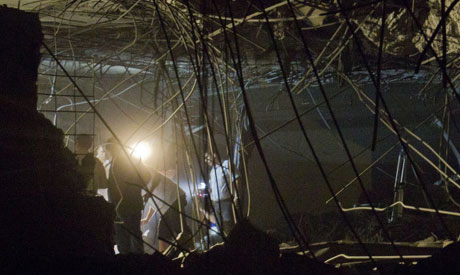
In this photo taken on a government organized tour, ruins of a house are seen at the site of a NATO missile attack in Tripoli, Libya, Saturday, (AP).
NATO has denied targeting Gaddafi, or his family, but said in a statement it had launched air strikes on military targets in the same area of Tripoli as the bombed site seen by reporters.
Libyan leader Muammar Gaddafi survived a NATO air strike on a Tripoli house that killed his youngest son Saif al-Arab and three young grandchildren, a government spokesman said on Sunday.
Libyan officials took journalists to the house, which had been hit by at least three missiles. The roof had completely caved in at places, leaving mangled rods of steel hanging down among splintered chunks of concrete.
"What we have now is the law of the jungle," government spokesman Mussa Ibrahim told a news conference. "We think now it is clear to everyone that what is happening in Libya has nothing to do with the protection of civilians."
The deaths have not been independently confirmed. But they would be sure to heap pressure on NATO -- which denies targeting the Gaddafi family -- from opponents of the mission who say it goes beyond its U.N. mandate to protect civilians.
It would also show the vulnerability of Gaddafi himself.
Fighting in Libya's civil war, which grew from protests for greater political freedom that have spread across the Arab world, has reached stalemate in recent weeks with neither side capable of achieving a decisive blow.
Ibrahim said Gaddafi's youngest son, Saif al-Arab, was killed in the attack. Saif al-Arab, 29, is one of Gaddafi's less prominent sons, with a limited role in the power structure. Ibrahim described him as a student who had studied in Germany.
The grandchildren killed were pre-teens, Ibrahim said.
"The leader himself is in good health. He wasn't harmed," he said. "His wife is also in good health.
"This was a direct operation to assassinate the leader of this country. This is not permitted by international law. It is not permitted by any moral code or principle."
NATO DENIES GADDAFI TARGET
"NATO continued its precision strikes against regime military installations in Tripoli overnight, including striking a known command and control building in the Bab al-Aziziyah neighbourhood shortly after 1800 GMT Saturday," it said.
NATO's commander of Libya operations, Canadian Lieutenant-General Charles Bouchard, said the target was part of a strategy to hit command centres that threaten civilians.
"All NATO's targets are military in nature...We do not target individuals," he said in a statement.
Any appearance of an assassination attempt against Gaddafi is likely to lead to accusations that the British- and French-led strikes are overstepping the provisions of the U.N. resolution to protect civilians.
Britain said on Sunday it was investigating reports the ambassador's residence in Tripoli had been attacked, along with other countries' diplomatic premises.
Venezuelan President Hugo Chavez, a long-time ally of Gaddafi, called the attack attempted murder.
"There is no doubt the order was given to kill Gaddafi. It doesn't matter who else is killed, kill Gaddafi... a murder, this is a murder," he said in Caracas.
Konstantin Kosachev, head of the international affairs committee in the lower house of Russia's parliament, told Interfax: "More and more facts indicate that the purpose of the anti-Libyan coalition is to physically destroy Gaddafi."
NATO's Bouchard said: "I am aware of unconfirmed media reports that some of Gaddafi's family members may have been killed. We regret all loss of life."
British Prime Minister David Cameron declined to comment on what he also called the "unconfirmed report".
He told BBC television: "The targeting policy of NATO and the alliance is absolutely clear. It is in line with the U.N. resolution 1973 and it is about preventing a loss of civilian life by targeting Gaddafi's war-making machine, so that is obviously tanks and guns, rocket launchers, but also command and control as well."
Gaddafi, who seized power in a 1969 coup, is fighting an uprising by rebels who have seized much of eastern Libya. He describes the rebels as religious extremists and Western agents who seek to control Libya's oil.
Short link: